Learning to work scientifically
Observing pollinators, counting flowers, assessing biodiversity: as part of the LERNfeld campaign, early-career researchers are introducing primary and secondary school pupils to scientific working methods and approaches.
It's May, but there's no sign of it on this grey cloudy morning. A chilly north wind is blowing across the meadows and groups of pupils are standing shivering in a sheep pasture. Not far off, the swoosh of traffic can be heard on Bünzstrasse linking Dintikon with nearby Wohlen.
The youngsters have marked off a square metre of ground using folding rules and are now in the process of determining the plants it contains. They've found only three kinds, which are hard to identify because sheep have eaten the plants to the ground: white clover, shepherd's purse, grasses. The pupils now have to count the individuals plants, which some don't find easy: "Everything's the same here," declares one. "Do we really have to count that?"
Yes, they do. Year 9's task is to carry out a mini scientific assignment as part of the LERNfeld environmental education and dialogue programme (see box). The quantitative and qualitative data are both equally important.
Learning to observe
The objective of LERNfeld is to get pupils between year 5 and the end of their baccalaureate year in secondary school to explore, through set learning activities, the role of agriculture in relation to biodiversity and climate change.
These learning activities involve using simple scientific methods for activities such as studying plant diversity in heavily and little-utilised cultivated land, observing insects on flowers, and finding out how flowers and pollinators adapt to each other.
Young university researchers as tutors
Instruction is provided by master's and doctoral students from Swiss universities – such as Ivo Beck, a technical assistant at the Institute of Grassland Sciences at ETH Zurich. His six-month course is even part of the curriculum of the Department of Environmental Systems Science, for which he receives a credit point. "I could easily go without that point, since I'm happy to be doing this work," says Beck. "Far more important from my point of view is the fact that I'm gaining teaching experience."
The 31-year-old scientist has completed his studies. Having read physics and specialised in climate and atmosphere, he's now in the process of obtaining his teaching qualification so that he can teach physics.
The pupils performing the LERNfeld activities on the land of organic farmer Ueli Meyer have spent several lessons preparing for the field research work. As with real research, they had to read themselves into the subject of biodiversity and come up with an introductory text for their assignments. They also formulated a hypothesis which they could then test using their field data. Out in the pasture, some pupils are now closely observing and meticulously recording insects visiting flowers. They'll then evaluate the data in the classroom, after which they'll discuss their findings with experts and fellow pupils before writing up the discussion part of their assignment.
Impressions "Lernfeld"
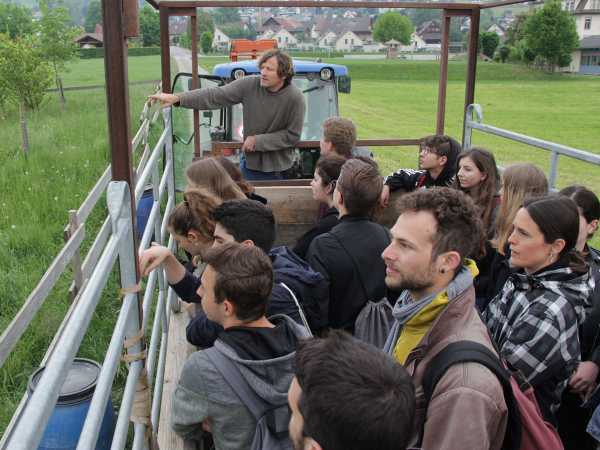
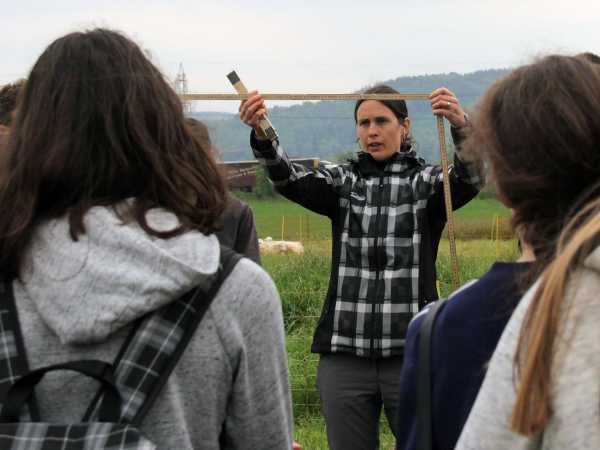
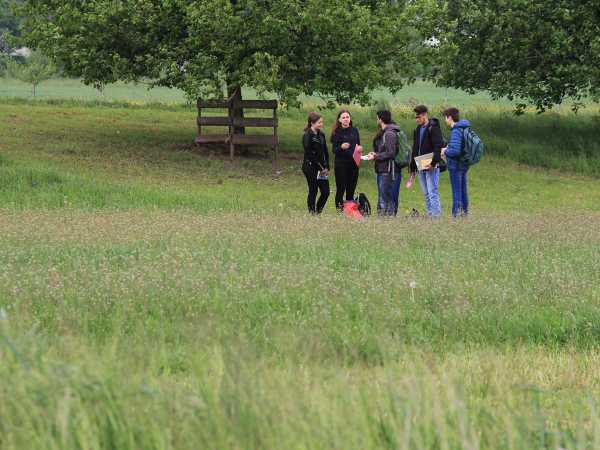
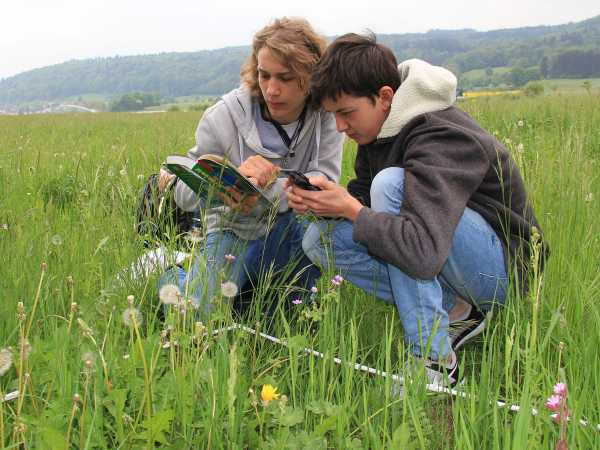
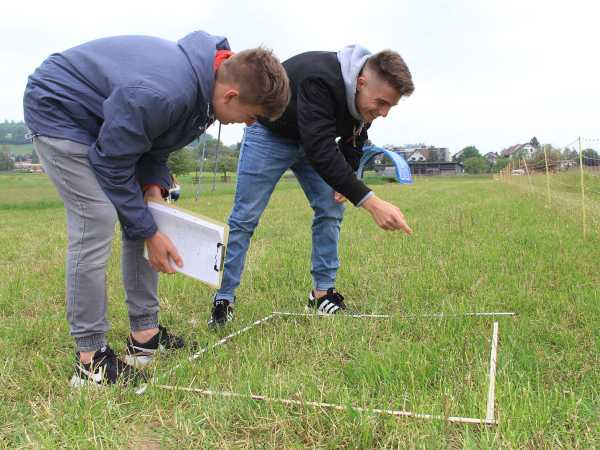
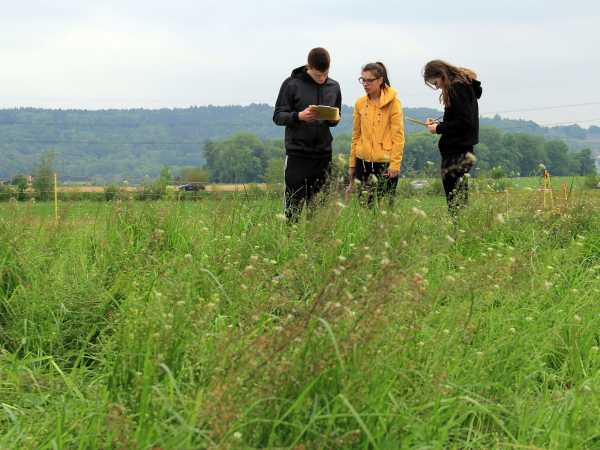
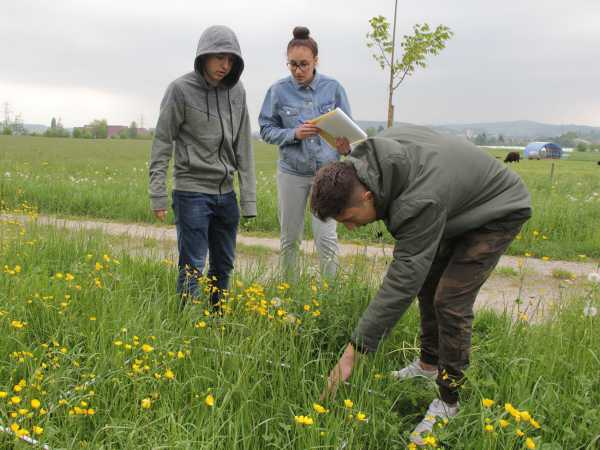
Noting small differences
"LERNfeld offers young people an opportunity to learn about plants, insects and biodiversity. For most of them it's probably the first time," says Beck. They could look in fascinating detail at the comparison between organically and conventionally farmed land. "Many of them quickly see a difference between intensively used land and, say, land under organic cultivation." He says that what they experience in the real world will remain with them for longer than the rather dry theory taught in the classroom.
"The idea is to get them to ask questions, speculate, observe and draw conclusions," says Nicole Müller, a district school teacher in Wohlen, who has registered her classes for the LERNfeld activities for a second time. Together with Ivo Beck and his colleague Luca Bussani from the University of Bern, she helps the pupils with their assignments. "Of course, those few hours give them only a limited insight into fieldwork."
Having herself graduated from ETH with a degree in environmental sciences, she nevertheless recognises the value of taking part in LERNfeld: "It's a project in which pupils not only learn about research, but can also apply and test their knowledge on the spot. They also get an idea of what agriculture is about, which is to be encouraged these days."
Keeping the difference in mind
Indeed, much of what the youngsters see and hear that morning is new and, for many of them, not easy. "It's quite a challenge," says one of two boys crouching before their square metre of ground, smartphone and field guide in hand. They're carrying out a vegetation survey in a bid to assess the biodiversity of a little-used strip of herbage. Fully absorbed, they use their digital and analogue aids to identify one flower as a Pyrenean cranesbill, another as rough hawksbeard (Crepis biennis).
Using a special botany app, the young people upload images and instantly receive comparative images of similar species. If the photo and internet material match, they note down the species name and count the number of specimens they observe in the square metre.
Beck is pleased with how things are going: "I very much hope that the youngsters are able to make a mental note of some of the plants so that they can use that knowledge on a Sunday outing somewhere," he says. After all, one of the aims of LERNfeld is to raise awareness of biodiversity amongst young people. "It would be great if they were able to instantly tell biodiverse from species-poor land in the future."
How ETH Zurich is involved in LERNfeld
LERNfeld is an environmental education and dialogue programme that investigates issues surrounding biodiversity and climate change in connection with agriculture. Most of the surveys are carried out on farms in the vicinity of the participating schools. LERNfeld is coordinated and offered by GLOBE (Global Learning and Observations to Benefit the Environment), a worldwide educational programme for primary and secondary schools. The programme was launched in the USA in 1994 under the patronage of the then Vice President, Al Gore. In 2017, 117 countries and 30,000 teachers were involved. The ETH Group for Grassland Sciences is a partner in the GLOBE project. Having helped to develop LERNfeld, the Group oversees the programme and now offers the course for early-career researchers. LERNfeld is established at ETH Zurich as an elective subject in the Master's programme curriculum at the Departments of Biology and Environmental Systems Science.
Further information: external page www.globe-swiss.ch
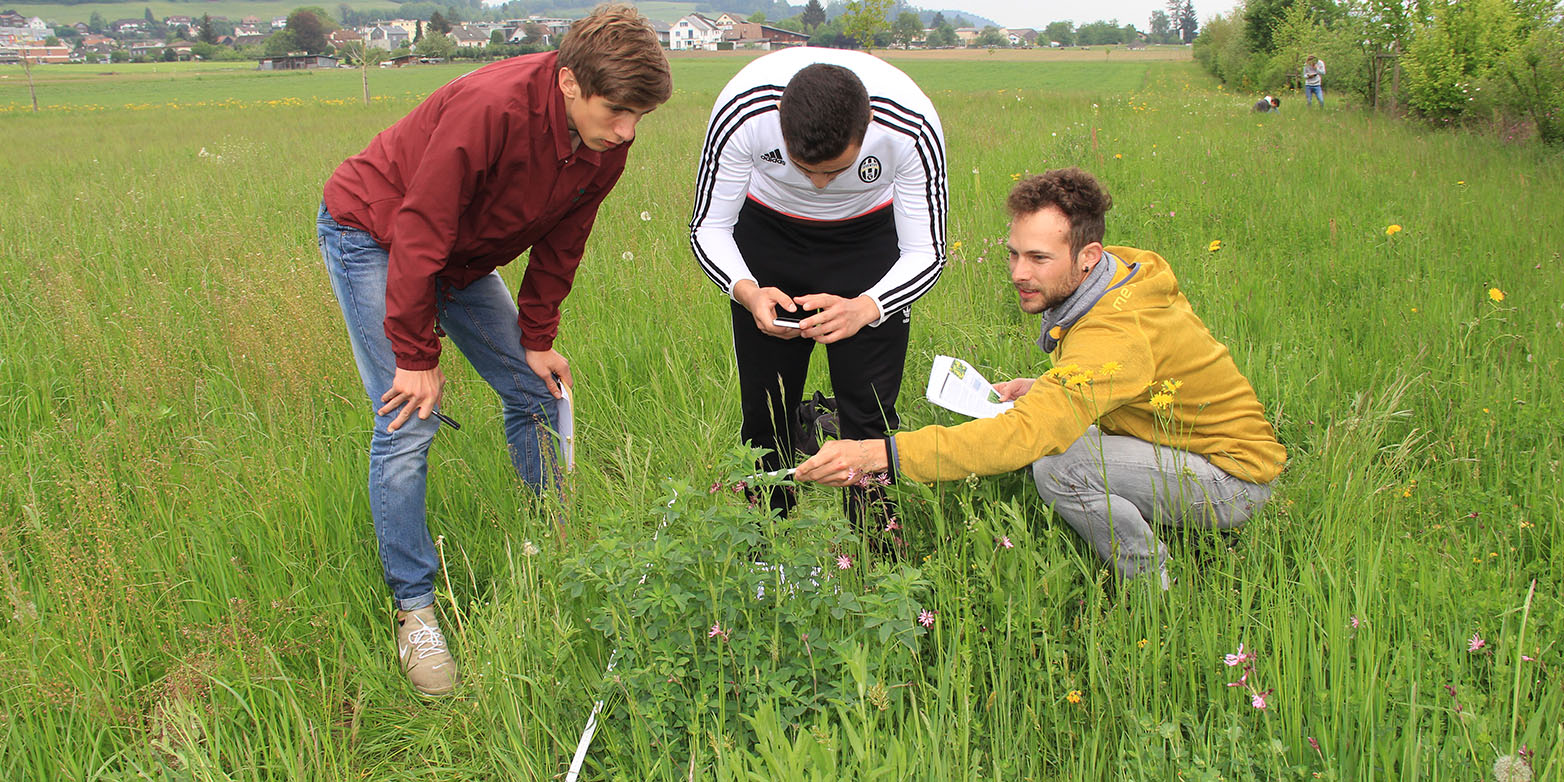
Comments
No comments yet